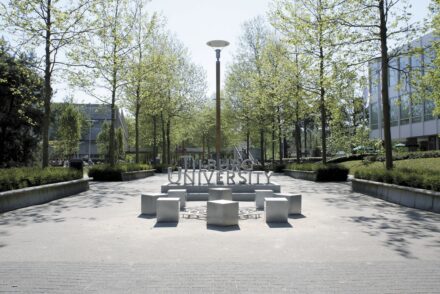What is TOP?
TOP, the ‘Tilburg Onderwijs Profiel’ (or: Tilburg Educational Profile) has recently been approved by the University Council and will be implemented during the coming years. But what is it? And do our employees think that this plan will work?
Tilburg University is preparing for the introduction of a new educational model that advocates training on a more personal and small-scale basis. With year groups of up to 40 people – and preferably even smaller seminars – the typical Tilburg student will be trained in all the ’21st Century Skills’ in order to connect with today’s labour market. This training includes a ‘free’ semester in which additional experience can be gained by travelling abroad, by working in a company, or by temporarily focussing on a completely different professional field. In addition, there will be ‘character-building activities’: self-reflective courses and moments as well as philosophy courses that enhance students’ ethical awareness.
 In addition to ‘knowledge’ and ‘skills’, also ‘character building’ will be an important issue. This is backed by the concept of the TiU-shaped student, the idea of the T-shaped professional: someone who has both specialized knowledge as well as a broad view of reality and enhanced cooperative abilities. The Executive Board itself is absolutely convinced of this philosophy, but it remains to be seen whether other parts of the university can be enthused for the program as well. There already has been a lot of grumbling within the participation council. Not least because within the program, there is quite a number of specific requirements for the curricula: 12 ECTS for Skills, 12 ECTS for Reflection and Philosophy, 30 ECTS for the free semester, and personal mentors for students who prefer to see the inside of a college room as little as possible. But what about the actual enthusiasm for this new Education Profile?
In addition to ‘knowledge’ and ‘skills’, also ‘character building’ will be an important issue. This is backed by the concept of the TiU-shaped student, the idea of the T-shaped professional: someone who has both specialized knowledge as well as a broad view of reality and enhanced cooperative abilities. The Executive Board itself is absolutely convinced of this philosophy, but it remains to be seen whether other parts of the university can be enthused for the program as well. There already has been a lot of grumbling within the participation council. Not least because within the program, there is quite a number of specific requirements for the curricula: 12 ECTS for Skills, 12 ECTS for Reflection and Philosophy, 30 ECTS for the free semester, and personal mentors for students who prefer to see the inside of a college room as little as possible. But what about the actual enthusiasm for this new Education Profile?
Moral crusaders
If you take the time to listen to university employees, you will mostly hear great consent with the substantive aspects of the vision and the educational profile. Note that this only concerns the contents (more on the practical side will follow). Of course, some elements of the educational profile and the vision call on the mockery of the personnel (“Is KKK really that convenient?”) and the question is to what extent the ‘big words’ contained in this plan will really come to ‘life’.
The TiU-shaped student? “Well, I don’t know whether that will catch on and really become a firm concept,” says Bart Vos, Associate Dean of the Bachelor programs at TiSEM and one of the people responsible for the creation and implementation of the new educational profile. But he doesn’t wish to make lame jokes about the wordings, no matter how marketing-like and popular they may sound: it’s the idea that lies behind them, and that idea is one to be advocated, according to Vos. Too often, he also notices ‘calculating students’ in the hallways; those students that are primarily engaged in simply gathering their credits (ECTS) with preferably minimal effort, “Sir, do we need to learn this for the next exam or not?” This attitude is, according to Fox, also partly due to the system. He fully supports a more activating and small-scale type of education, where students can’t just hide behind the group anymore.
Fox does have some concerns about the moral and ethical side of the story. The author of the educational vision, Herman de Regt, emphasized to Univers that it certainly is not the intention to cultivate ‘moral crusaders’ and to compel everyone to the vision of someone like Cobbenhagen: “We don’t want to impose a mould onto our students nor tell them how to think about ethical issues; they just need to learn to sufficiently take into consideration all the moral implications of their actions, for example, in scientific practice.” It does, however, indeed mean that philosophy and ethics will press a heavier stamp on their curriculums and Fox wonders whether his students are waiting for something like this: “I can personally imagine its importance, but if the students’ evaluations aren’t good enough, we do have a problem.” In addition, Fox also believes that ‘hard’ science should remain the core business: “We shouldn’t become wimps.” He foresees a ‘spirited debate’ at the faculty about where and how these courses are to be integrated.
Practical concerns
In particular when it comes down to the practice, concerns rise among the sceptics. And even a non-sceptic like the Program Director for Psychology, Seger Breugelmans, can imagine that Program Directors and program makers are faced with an ordeal. He himself confesses to have had a bit of ‘luck’ here: “Two years ago we already started to organically modernise our courses and also set out for re-design and re-profiling.” This new bachelor’s program contains virtually every element TOP demands: sufficient ECTS for Skills and for reflective courses, for Philosophy of Science as well as for Ethics. Furthermore, the student has all the freedom to go abroad for six months. Small-scale colleges and classes have been introduced as well: in addition to regular full-scale lectures, we now also work with groups of up to 40 students and mentor groups of no more than 15 to 25 students. TOP does indeed motivate Breugelmans to give serious thought to student coaching, but in Psychology, they are already well on track.

Illustratie Jeroen de Leijer
Do the other larger training programs also meet the requirements of TOP? Vice-Dean for Education of the Faculty of Law, Marc Loth, sees few problems and plenty of opportunities in the short term for the implementation of the required changes. With ‘blended learning’, for example, where courses are linked to individual feedback, and new minors, in which students are offered a combination of disciplines and professional fields that complement each other, such as forensics, criminology and psychology. But law lecturer Erik-Jan Broers is still very curious about the way the faculty intends to downscale larger courses like his: “Of course the idea of a University College is a nice one, as it creates a much higher interaction level with the students, but how are you going to organise this for over three hundred freshmen? Currently we’re trying to stimulate interaction in the subject of legal history by implementing so-called dialogue lectures, in which the larger group is divided into three groups of 90 to 100 students. But even with that formula we’re already understaffed.” Loth says it is a misunderstanding to assume that TOP prohibits all large-scale lectures, as is often thought. Small-scale education is not an end in itself; it is about paying more attention to the students, which can also be achieved with more individual feedback, according to Loth.
Effectiveness and measurability
Breugelmans also thinks that a great deal of scepticism about TOP stems from a “too literal way of reading” the plans. “I don’t see it as a straight jacket, but rather as a nice suggestion, an incentive to look at your own educational program. We still give regular lectures as well.” But it certainly is not the intention to then just simply leave everything as it is, and several courses are currently struggling with the way they can do things differently.
Monique Pollmann is a university lecturer at Communication and Information Sciences. She teaches, among others, courses in the statistical subject of ‘Analysis of Variance’. She recently cooperated with and participated in a major curriculum revision of the education program, entirely in the spirit of TOP. The usual, regular lectures were replaced by video lectures in Statistics, so that the teachers could devote more time and attention to the tutorial seminars and work groups, which were expanded within the course of the program. But guess what? “Many students attended the seminars insufficiently prepared, so I had to explain the complete matter to every single student all over again, fourteen to fifteen times. It would’ve been much more efficient if I had explained it to all of them at once, in a regular lecture.”
Of course, Pollmann hopes that students will be better prepared when TOP is introduced, but the question is whether that is realistic. “There are many students who only come to lectures to achieve mediocrity, to simply suffice. And those students should have every right to work that way as well.” Tilburg University simply isn’t Harvard, with only careerists and whizzes, but all the more a university for the people of the region, who merely wish to get a fine diploma, after which they can progress into real life and start on a job. Pollman states: “TOP seems to have been mainly created for the top student. The question is how to motivate the majority of students to really participate in TOP. So far, I’ve never heard anyone speak about that issue, but I would definitely like to get some practical advise on this as well.” Moreover, she doubts the effectiveness of small-scale training courses. “Professional literature about the matter only shows that it makes sense in very small groups of up to ten students. Group sizes like that are quite difficult to realize here.”
The fact that the positive effects of the TOP doctrine still remain in the dark was also reason for economists like Bert Willems to distrust the concept. At present, a number of economic programs already produce very good figures in the field of education and ‘academic counselling’. Then why impose a top-down approach? Program Directors are now required to adjust their trainings and courses significantly, while the benefits remain unproven, whereas each program has so far been nicely tuned to the very specific target audiences. Willems points out that the ‘benefits’ of this major operation – which will cost more than one million in the first year – are still unclear. “There are no quantitative data on those benefits and there have been no pilot studies regarding this form of mentoring and education.”
However, with the consent of the University Council on 10 February, it is already certain that TOP will be implemented in all faculties. Rector Emile Aarts stated repeatedly though, that he will keep the dialogue ‘open’, that individual elements can be adjusted on an interim basis and that faculties will also in part be given the opportunity to interpret and adapt the plan to their own interpretation.
Translated by: SoGraTex






